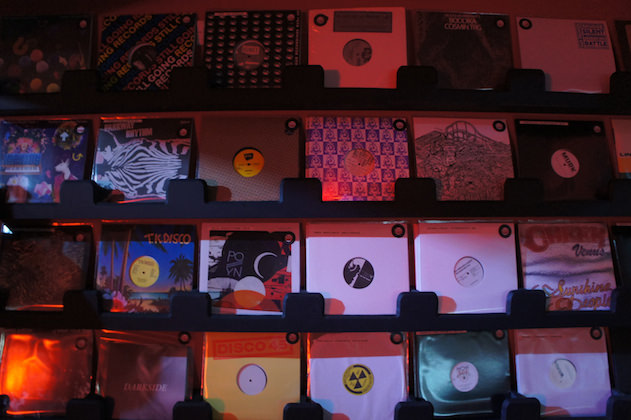
Second-hand sales
And what of second-hand sales, which aren’t covered by the music industry’s official figures and don’t contribute any revenue directly to labels? Surely second-hand sales figures are just as valid a tool for analysing the health of the vinyl market?
Unfortunately it’s virtually impossible to judge the overall scale of the second-hand record market across all independent shops, record fairs and private sales, but figures from two of the biggest marketplaces for second-hand vinyl suggest that it’s a significant market.
eBay.co.uk inform us that 81,594 vinyl records were sold on the site in 2012. Surprisingly, Discogs is an even greater success; According to the company’s press department, 2.5m vinyl records were sold through the online music marketplace in 2012. 96% of those sales came from back catalogue items (that is, records with pre-2012 release dates) while 19.25% of all sales were shipped to UK buyers. It’s worth noting that the best-selling releases on Discogs in 2012 were overwhelmingly biased toward dance music.
What does all of this mean? The unavoidable fact is that without taking into account second-hand sales, genre and limited-edition special releases, those headlines about the strength of vinyl sales are so imprecise as to be meaningless. Even if overall vinyl sales are at record-breaking levels, that’s not much comfort to the thousands of small independent vinyl labels regularly releasing runs of 200 or 300 records at a time and struggling to make a profit.
The assumptions on which Record Store Day is founded are hugely significant, but if we do accept that the event is necessary – or at the very least acceptably benign – then is it really fulfilling its duty to shops, labels and customers?
Even if overall vinyl sales are at record-breaking levels, that’s not much comfort to the thousands of small labels struggling to make a profit.
Good for the stores?
As a celebration of record shops, the most obvious question is whether RSD has a positive effect for the shops themselves. Surprisingly, the impact of the event isn’t entirely positive even for a large, well-established independent shop like London’s Rough Trade. Co-owner Stephen Godfroy describes Record Store Day as ‘a blessing and a curse’. “We appreciate some of the media attention it generates,” he explains, “but the net benefit is not as much as you’d think. For example, it requires a hell of lot of work over and above the regular hard work we put in.”
So surely the main benefits must fall to the consumer? Not necessarily. “The day itself attracts a lot of flippers,” Godfroy explains. “People who buy products to resell on eBay at exploitatively high prices, often denying our valued and regular customers the opportunity to purchase the limited-edition items released on the day. Overall, RSD is a good idea, and a great day of celebration, but it does suffer from a number of avoidable flaws.” Has the event had a positive impact in terms of raising awareness of independent records shops in the UK? “I think it’s been good and bad. Good in raising the ‘lowest common denominator’ profile of independent record stores. Bad in that the resulting media attention lacks the sophistication to accurately report on the 365-days-a-year value, success and relevance of a music store like Rough Trade East.”
The benefits for smaller specialist stores are even more difficult to quantify. Iain French co-owns Waxwerks, an independent dance music specialist in Leeds which opened just over a year ago. Waxwerks will be hosting an in-store appearance from Slowdown Sounds tomorrow, but only on an unofficial basis. Why unofficial? “We emailed the organisers a couple of times but never heard anything back. We’re just flying the flag ourselves this year. We’re only a new store so we’re not really sure if we’re on their radar or not.”
Waxwerks didn’t make any effort to be officially involved last year, but still enjoyed a boost in trade on the day. “We certainly noticed an improvement in sales and footfall last year,” Iain recalls. “It definitely had a positive effect on our day’s trade and increasing awareness of the shop.”
French remains positive about the potential of Record Store Day, even if he’s unsure whether it has much of an impact on year-round trade: “I think worldwide events like this can only help the cause. People are starting to appreciate the outlets that have survived the last decade a lot more, and we’re noticing a whole new generation of young vinyl buyers getting the bug. I think events like RSD help to outline the fact that if people don’t vote with their feet then they won’t have a store to shop at.”
People are starting to appreciate the outlets that have survived the last decade a lot more, and we’re noticing a whole new generation of young vinyl buyers getting the bug.
Perhaps just as importantly, the day serves as a reminder of why so many of us wanted to celebrate record shops in the first place: “They’re fun events that highlight how enjoyable spending an afternoon sifting through racks of wax can be! We’ve got loads of new house and disco titles in stock and we’ve made bigger orders than normal in anticipation of a busy one. We’ll have drinks offers on beer, wine and spirits all day as usual and we’ll have a real party atmosphere all day. Come along and get involved!”

08.10 PM
Great article, some good comments and some good questions asked. I fully support RSD and thought this year (in London) there was a great atmosphere. Lets hope it carry’s on for the right reasons and continues to make a positive impact
01.49 PM
It’s like having an Independent Fishmongers Day,. or an Independent Film Day – there is nothing wrong with a lot of fish in the supermarket or film at the Odeon, but if that was all that was on offer, the world would be a much less interesting place.